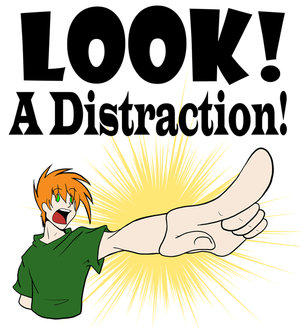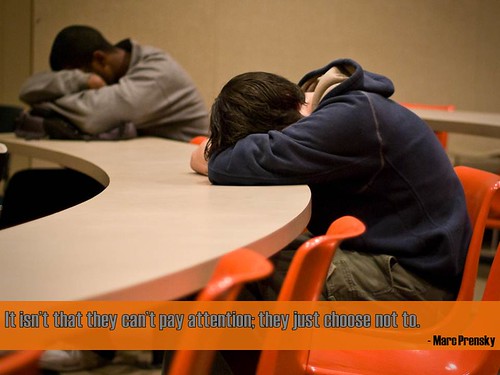 |
| EDUCATORS BEWARE!! |
I came across this article today while browsing through my PLP Ning community and had a pretty strong reaction to what I read. I have posted some of my thoughts on the article below.
You can read the entire article here
-“When rock ’n’ roll came about, we didn’t start using it in classrooms like we’re doing with technology.”-The problem with this statement is that it shows a person that does not truly understand the impact that "technology" is having on the world. Rock 'n 'Roll had an effect on the aesthetic opinions of many people but did not fundamentally change the landscape of anything except music. "Technology" (quoted because they are using it as a generic term and refuse to be specific) has changed the face of the
-technology lovers ... are often quick to claim that today's students are "digital natives" who learn differently and need a different kind of school."
-This article uses a misrepresentation of the term "digital native". The term does not imply that the students immediately know how to use technology in a relevant way. The definition according to Wikipedia (the irony is not lost on me btw): "A digital native is a person for whom digital technologies already existed when they were born, and hence has grown up with digital technology such as computers, the Internet, mobile phones and MP3s." Notice it says nothing about them innately knowing how to use technology. Our job as teachers is to change the "glib and facile use" into significant usage. To make a comparison, If you sent a group of kids into the library 30 years ago to do research you never just assumed that they understood how to find all the relevant information, they had to be trained how to use the library and conduct research. This is the same concept with technology, they must be shown how to use it productively.
-They often mistake the glib and facile use of technologies for competence
-Several recent studies of home use of laptops by low income students have reported disappointing results in terms of academic performance at school.-The first issue that strikes me here is the fact that they are rating these kids by academic performance. If the technology advocates are saying that kids need a new way of learning that involves technology, you can't refute their claims by handing laptops to kids and testing if their academic scores go up. They need to test if the students understanding went up anywhere else. I doubt that many of you make it a point to research the proper use of colons vs. semi-colons during your free time on the internet. Instead you probably choose to research the things that interest you on a personal level and which are probably not accounted for on a standard academic test. I posted a video on here previously that touches on the fact that kids are significantly different than their predecessors when it comes to learning. The other problem is that the laptops were given to "low income" students, who we could assume have had little to no access at home before this and would most likely be interested in playing around on the new gadget that they haven't had significant access to before. I would like to look more at this study and see exactly where these results came from but the way it is stated in this article it doesn't make logical sense.
-So the fact that today's students, some of whom have never seen a video-cassette, don't want to read a novel from 1963 which "explores issues of science, technology, and religion, satirizing the arms race and many other targets along the way" means that they lack quality and depth of thought? The fact that students favor creating and watching YouTube videos and posting on Facebook in no way shows a lack of quality or depth of their thought. Instead of just writing the kids off and saying that just because they don't want to read what we tell them, let's incorporate the activities they enjoy in the learning process. Have them create a digital video re-enacting one of the scenes from the book, or get them to create a Facebook profile for one of the characters. There are plenty of options open to those willing to think outside of the box.-When Matt Richtel reports in his article that many bright students at Woodside High do not finish reading assigned classics like Kurt Vonnegut’s Cat’s Cradle because they favor activities like Facebook, YouTube and making digital videos, it is evidence that the quality and depth of thought of such students has been weakened.
Maybe choose a more current book?
-"Look how modern we are! Our students have learned to express important ideas in just a few monosyllabic words and characters. No need for paragraphs, logic or evidence. No need for figurative language or a carefully constructed persuasive essay. No need to read Vonnegut or Eliot or Dickinson. The Cliff Notes and YouTube will suffice nicely."(I will assume the author is being facetious here but I will argue against it anyway...) Who actually says this? Logic and evidence are two of the most important aspects when discussing technology and the future. Why is it not important for students to learn to "express important ideas in just a few monosyllabic words and characters"? This is how the world operates now. Students need to learn figurative language, they need to learn to be persuasive but guess what, people aren't persuaded by essays anymore. They are persuaded by blogs and Twitter and Facebook and Google and all of those other technologies that you seem so afraid of. Ideas are related quickly and succinctly today, and students must learn how to both create and navigate that stream of information properly, not be taught to demonize it.
-Is that book worth the time and attention of every high school student or do we buy into the notion that each student should be allowed to study whatever they wish?-So standardized testing is the better option? How about a balance? Students do need to be guided along their studies, but force feeding them literature, often chosen by non-educators as classics is not the way to do it. Sure it may require a little more work on the teachers part but that may well be part of their job.
-Unfortunately, in some schools the 1-on-1 imperative is so strongly voiced that some teachers will be reluctant to ask students to give full attention or to close the lids of their laptops.
I know teachers like this
-A teacher who can handle a standard classroom and gain attention can learn to handle a 1-on-1 environment will equal efficiency. This is a problem that will happen but cannot be the end all for tech in the classrooms. We must adjust, not outlaw.
Let me know what you think in the comments. Is Jaime McKenzie right in saying that Education Technology should kept out of 1-on-1 and limited to computer rooms? Should teachers learn to teach with technology?


No comments:
Post a Comment